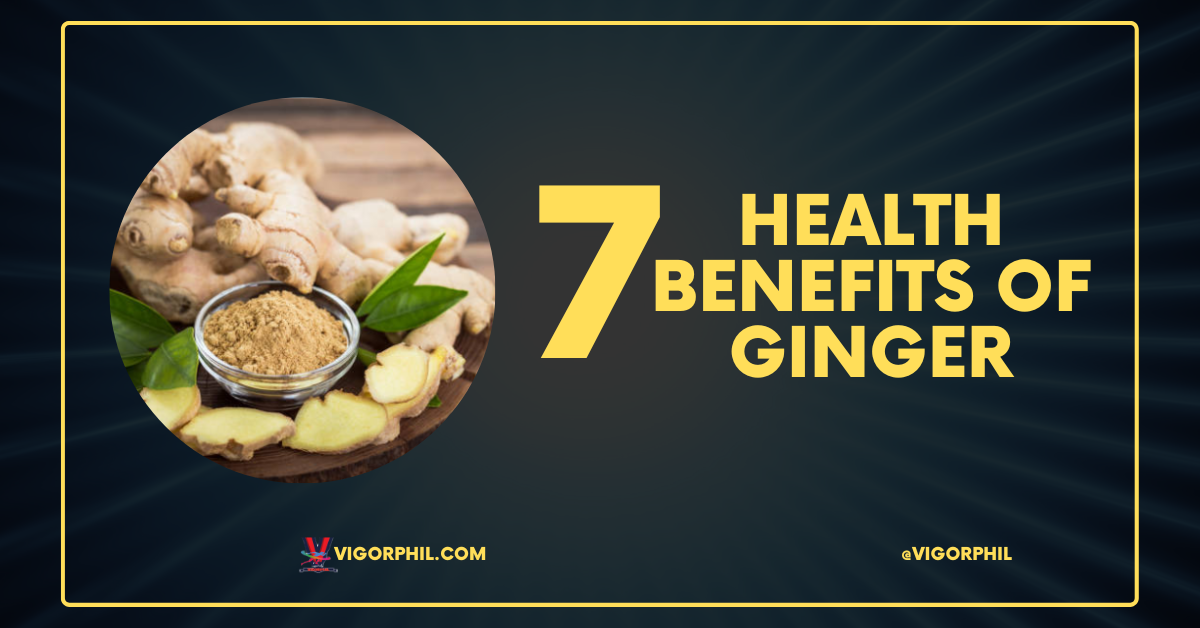Ginger is a popular spice and medicinal herb that has been used for thousands of years in traditional medicine. It is known for its strong and distinct flavor, as well as its numerous health benefits. Some of the key health benefits of ginger include reducing nausea and vomiting, reducing muscle pain and soreness, reducing menstrual pain, improving brain function, reducing the risk of cancer, and reducing inflammation. Additionally, ginger has antioxidant properties that can help protect the body against damage from harmful molecules. In this article, we will be discussing the 7 health benefits of ginger.
1. Ginger is an Anti Inflammatory Agent
Ginger has been used for centuries as a natural anti-inflammatory agent. It contains compounds such as gingerol and shogaol, which have been shown to have potent anti-inflammatory effects. These compounds work by blocking the production of inflammatory molecules in the body, such as prostaglandins and leukotrienes, which are involved in the inflammatory response.
One study found that taking a daily ginger supplementation reduced muscle pain by 25% in people who did regular exercise. Another study found that a specific ginger extract reduced menstrual pain by 33% in women.
Ginger has also been found to be effective in reducing inflammation in conditions such as osteoarthritis and rheumatoid arthritis. In a study of patients with osteoarthritis of the knee, those who took a ginger extract for six weeks had a significant reduction in pain and inflammation compared to those who took a placebo.
Additionally, ginger has been found to have anti-inflammatory effects in other areas of the body, such as the gut and lungs. It has been shown to reduce inflammation in the gut in conditions such as inflammatory bowel disease and colorectal cancer.
Overall, ginger’s anti-inflammatory properties make it a powerful natural remedy for reducing pain and inflammation in a variety of conditions.
2. Ginger is a remedy for cold and flu
Ginger is a popular natural remedy for cold and flu symptoms. It has anti-inflammatory and antioxidant properties that can help to reduce sore throat, nasal congestion, and fever. Ginger can also help to ease nausea and vomiting, which are common symptoms of the flu.
One way to use ginger for cold and flu relief is to make a tea by simmering freshly sliced ginger in water for a few minutes. You can also add honey or lemon for added flavor and to increase the soothing effects. Additionally, ginger supplements, such as ginger capsules or ginger extracts can also be taken as an alternative, but it’s best to check with a healthcare professional before taking any supplement.
It’s worth mentioning that ginger is considered safe for most people, but in high doses it can cause stomach upset, heartburn, and other side effects. Also, ginger might interact with certain medications such as blood thinners, so it’s important to talk to your doctor if you’re taking any medication before using ginger as a cold and flu remedy.
3. Ginger is a natural pain relief
Ginger has been used for centuries as a natural remedy for pain relief. It has anti-inflammatory properties that can help to reduce pain and swelling caused by conditions such as osteoarthritis, rheumatoid arthritis, and menstrual cramps. Studies have shown that ginger is effective in reducing pain and inflammation, and may be as effective as non-steroidal anti-inflammatory drugs (NSAIDs) such as ibuprofen.
One way to use ginger for pain relief is to consume it in food or supplement form. Fresh ginger can be grated and added to meals, or ginger supplements can be taken in the form of capsules or extracts. Additionally, topical ginger preparations, such as ginger ointment or ginger oil, can be applied to the skin to help relieve pain and inflammation in local areas.
It’s worth noting that ginger is considered safe for most people, but high doses may cause stomach upset and other side effects. Also, ginger may interact with certain medications, so it’s important to talk to your doctor if you’re taking any medication before using ginger as a pain relief remedy.
It is also worth mentioning that ginger should not be used as a sole treatment for any serious condition and it is always best to consult with a healthcare professional for proper diagnosis and treatment.
4. Ginger promotes cardiovascular health
Ginger has been traditionally used to promote cardiovascular health and studies have shown that it may have beneficial effects on heart health.
One of the ways in which ginger may benefit heart health is by reducing high blood pressure. Studies have shown that consuming ginger powder or taking ginger supplements can lead to a small but significant reduction in systolic blood pressure (the top number in a blood pressure reading) in people with hypertension. Ginger may also have a beneficial effect on cholesterol levels. Some studies have shown that consuming ginger powder can lead to a reduction in total cholesterol and low-density lipoprotein (LDL) cholesterol, which is commonly known as “bad” cholesterol.
Ginger may also have antioxidant and anti-inflammatory properties that may be beneficial for heart health. These properties may help to reduce the risk of heart disease by preventing the formation of blood clots and reducing inflammation in the blood vessels.
It is also worth mentioning that ginger should not be used as a sole treatment for any serious condition and it is always best to consult with a healthcare professional for proper diagnosis and treatment. And as always, a healthy lifestyle including a balanced diet and regular exercise is recommended to maintain cardiovascular health.
5. Ginger a rich source of antioxidants
Ginger is a rich source of antioxidants, which are substances that can help to protect the body against damage caused by free radicals. Free radicals are molecules that can damage cells and contribute to the development of chronic diseases such as cancer, heart disease, and diabetes.
Ginger contains several antioxidants, including gingerol, shogaol, and zingerone, which have been shown to have anti-inflammatory, anti-cancer and anti-oxidative properties. These antioxidants can help to neutralize free radicals, reducing the risk of damage to cells and tissues.
Studies have shown that ginger may have antioxidant properties that can help to protect against various types of cancer, including ovarian, prostate, and colon cancer. Additionally, ginger may help to reduce inflammation, which is a major risk factor for chronic diseases such as heart disease and diabetes.
It is also worth noting that ginger should not be used as a sole treatment for any serious condition and it is always best to consult with a healthcare professional for proper diagnosis and treatment. And, a diet rich in fruits and vegetables, which are also good sources of antioxidants, is recommended to help maintain overall health.
6. Ginger Aids Digestion
Ginger is a natural remedy for digestive issues such as bloating, gas, and constipation. It contains compounds like gingerol and shogaol which have anti-inflammatory and antioxidant properties. These compounds help to relax the muscles in the intestinal tract, which allows gas and other stomach contents to pass through more easily. Ginger also stimulates the production of digestive enzymes, which can help break down food more efficiently. Additionally, ginger has been shown to help relieve nausea and vomiting, making it a useful natural remedy for morning sickness and other forms of nausea.
7. Ginger have anti-cancer properties
Ginger has been found to have anti-cancer properties in several studies. The active compounds in ginger, such as gingerol and shogaol, have been shown to have anti-inflammatory and antioxidant effects, which may help to prevent the development and growth of cancer cells. Additionally, ginger has been found to have a particularly strong effect on ovarian, colon, and lung cancer cells, with studies showing that ginger can inhibit the growth and spread of these cancer cells. However, it’s important to note that more research is needed to confirm ginger’s anti-cancer effects and determine the optimal dosage and method of consumption.
Conclusion
In conclusion, ginger is a versatile and powerful herb that offers a wide range of health benefits. It has been shown to be effective in reducing nausea and vomiting, reducing muscle pain and soreness, reducing menstrual pain, improving brain function, fighting infections, reducing blood sugar levels, and lowering cholesterol levels. These health benefits make ginger a valuable addition to any diet. However, it is important to note that ginger may interact with certain medications, so it is always best to consult with a healthcare professional before incorporating large amounts of ginger into your diet.











